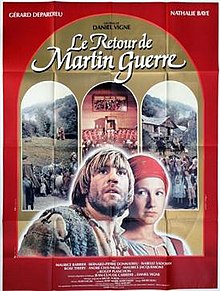The Return of Martin Guerre
| The Return of Martin Guerre | |
|---|---|
 |
|
| Directed by | Daniel Vigne |
| Produced by | Daniel Vigne |
| Written by |
Daniel Vigne Jean-Claude Carrière Natalie Zemon Davis |
| Starring |
Gérard Depardieu Bernard-Pierre Donnadieu Nathalie Baye Roger Planchon Dominique Pinon |
| Music by | Michel Portal |
| Cinematography | Andre Neau |
| Edited by | Denise de Casabianca |
| Distributed by | European International |
|
Release date
|
14 May 1982 |
|
Running time
|
122 min |
| Country | France |
| Language | French |
The Return of Martin Guerre (Le Retour de Martin Guerre) is a 1982 French film directed by Daniel Vigne, and starring Gérard Depardieu. It was based on a case of imposture in 16th century France, involving Martin Guerre.
The film relates a historical case of alleged identity theft. Martin Guerre leaves his young wife in a small French village to go fight in a war, and to travel. Eight or nine years later, Martin (played by Depardieu) returns to resume his life. The man is initially acknowledged and welcomed by the wife, family, and friends because he knows the intimate details of his former life.
As time passes, however, vagabonds identify Martin as Arnaud of the neighbouring village of Tilh, but the villagers dismiss these claims as lies. But when Martin makes a demand for money he's owed by his uncle, the uncle is outraged and attacks Martin. This leads to a trial on his identity, with his life at stake, since if he is not Martin he and Martin's wife Bertrande are adulterers and their children bastards. This trial comprises most of the film.
Martin argues well, and the villagers are divided on whether the man is in fact Martin, Bertrande siding with him. After several elevations of the proceedings up to a court in the Parlement, the judge, Jean de Coras, prepares to acquit Martin primarily on the strength of the testimony of Bertrande.
At the last minute, another witness appears in court, bearing an even stronger resemblance to the young Martin and casting everything into doubt once more. The impostor confesses that he was a soldier with the real Martin, who said he was never going back to his village, upon which the impostor decided to take his place. Even Bertrande changes her mind and says the new witness is Martin. Arnaud is sentenced to death.
Some time later, De Coras visits the village to tell Bertrande that she has been acquitted and is innocent of conspiracy with Arnaud. But he has deduced that she recognized the impostor from the very beginning and asks her why she claimed he was Martin. She says that he was a better husband and man, and they had a good life together. De Coras asks her then why she changed her mind at the last minute. She says she saw in Arnaud's eyes that the case had become hopeless and that he wanted her to feign ignorance so as to live for herself and her children.
Arnaud is led to the gallows, repenting all the while. A voiceover closes the historical framework by mentioning that de Coras was executed some years later for his Protestant beliefs.
The film was nominated for Best Foreign Language Film by the U.S. National Board of Review of Motion Pictures.
...
Wikipedia
